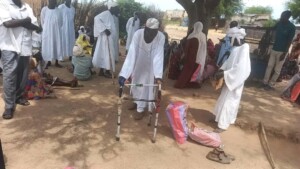Four new ‘watery diarrhoea cases’ recorded in Central Darfur
The number of patients suffering from acute watery diarrhoea -suspected to be cholera-continues to decline in Central Darfur’s Nierteti locality.
A volunteer reported to Radio Dabanga that the isolation ward at the Hospital of Nierteti received two new patients this weekend.
He said that four people in total were being treated at the ward on Sunday.
The source added that the isolation unit at Kuweila village in south-east Nierteti admitted two new cases on Saturday and Sunday.
 Villages affected by 'acute watery diarrhoea' in Nierteti locality (OCHA map of South Darfur)
Villages affected by 'acute watery diarrhoea' in Nierteti locality (OCHA map of South Darfur)
The number of patients suffering from acute watery diarrhoea -suspected to be cholera-continues to decline in Central Darfur’s Nierteti locality.
A volunteer reported to Radio Dabanga that the isolation ward at the Hospital of Nierteti received two new patients this weekend.
He said that four people in total were being treated at the ward on Sunday.
The source added that the isolation unit at Kuweila village in south-east Nierteti admitted two new cases on Saturday and Sunday.
‘Watery diarrhoea’
In spite of numerous independent confirmations (conducted according to World Health Organisation (WHO) standards) that the disease which broke out in Blue Nile State in August 2016 was cholera, the Sudanese authorities and several international organisations still call it ‘acute watery diarrhoea’.
The spread of the infectious disease in Sudan last year turned into epidemic proportions.
The UN Office for the Coordination of Humanitarian Affairs (OCHA) reported in its biweekly bulletin last month that quick action by the Sudanese government and the UN has been instrumental in curbing a new outbreak of “Acute Watery Diarrhoea” in Central Darfur in February.
The measures included the establishment of isolation centres, bolstering water quality control, rapid response training, and close monitoring of the situation on the ground.
The outbreak in entailed 300 new cases, reported after a ten-week period of zero cases in Central Darfur, and a three-week period of zero cases nationwide, OCHA stated.
Follow #CholeraInSudan, #الكوليرا_السودان for ongoing coverage by Radio Dabanga











 and then
and then